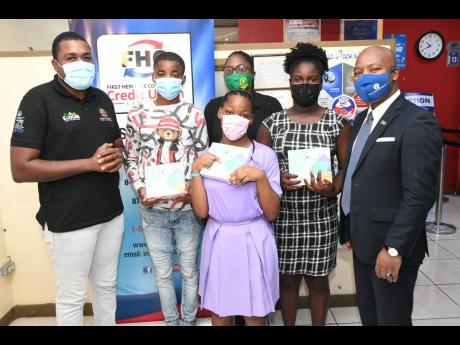Disabled students face uphill battle in virtual classrooms
Principal grateful for FHC tablet donation
The May Pen, Clarendon Unit of the Lister Mair/Gilby High School for the Deaf has been severely impacted by the COVID-19 pandemic with fluctuating daily attendance in online classes, where, at times, up to 95 per cent of the students are absent.
Principal Portia Byfield-Wedderburn, who lost her ability to hear more than two decades ago at age 13, told The Gleaner through an interpreter that a lack of devices and challenges in accessing the Internet were the major hurdles for children with disabilities.
Speaking at a tablet handover ceremony by First Heritage Co-operative (FHC) Credit Union on Monday, Byfield-Wedderburn expressed gratitude for the donation, noting that it would help to alleviate some of the challenges.
“Because of [the lack of devices and Internet access issues], we had low attendance, but we got donations from some organisations and now FHC has also contributed so we’ll see some improvement in attendance, but the challenge now is Internet ... . That is one of the biggest challenges we have now. We have the devices, but no Internet,” Byfield-Wedderburn said as eight of her students received devices from the financial institution.
She noted that while support for the deaf community has improved, there was still more to be done.
“Persons are focusing more on persons with disabilities, so I cannot complain. I have seen improvement but going forward, we would like to see some more. ... It’s good that people are learning about us and giving more support,” she said.
Another challenge, she pointed out, was that several disabled students were at a further disadvantage in the virtual learning environment as their employed parents are not able to provide adequate supervision.
“Students who are deaf need more supervision,” stressed Byfield-Wedderburn, noting that the transition to virtual learning has caused some teething pains for students and teachers.
She, however, acknowledged that the Ministry of Education has helped in navigating the challenges.
Marvalyn Sherwood-Barker’s 15-year-old daughter was among the eight tablet recipients on Monday.
She told The Gleaner that it has been no easy feat trying to navigate the remote-learning environment, adding that she is anticipating the resumption of face-to-face classes.
“My daughter is a little frustrated because she’s the only child at home, so the fact that she can’t go out and socialise with her peers makes it a little harder. Sometimes she’s acting up, but her teacher is really good with her and she gets her to calm down and we’re seeing improvements, but we’re anticipating face-to-face learning because I think that will alleviate some of the challenges,” Sherwood-Barker said.
NEW CHALLENGES
Another parent, Keneisha Baker, said that not being proficient in sign language has unearthed new challenges for her since the pandemic mandated online learning.
“Sometimes mi can’t bother. The online class is difficult ... . Sometimes I don’t know how to interact with him entirely, so it’s very difficult,” she bemoaned.
Education State Minister Robert Nesta Morgan commended FHC, hailing the donation as a noble display of concern for the state of the nation’s children.
He added that while the ministry has been working to alleviate the inequality among students and has made significant progress, the need for devices is far too great for any one entity to fill.
“The harsh reality is that the demand for these resources is greater than the Government’s ability to supply every child in need. This is where other groups within our society, such as the private sector, demonstrate their importance. Whether 50 or 500 in number, the impact of these devices on the lives of the recipients will remain immeasurable,” Morgan said.
FHC’s tablet donation initiative is aimed at equipping 43 special-needs students and 17 pupils in primary schools with devices.
May Pen Branch Manager Norman Williams told The Gleaner that his team decided to assist students with disabilities as they were at a greater disadvantage.
“It’s a part of our corporate social responsibility. It’s a part of our mantra; we speak it every day. ... All the communities we have our operations in, we want to impact them positively,” he said.

